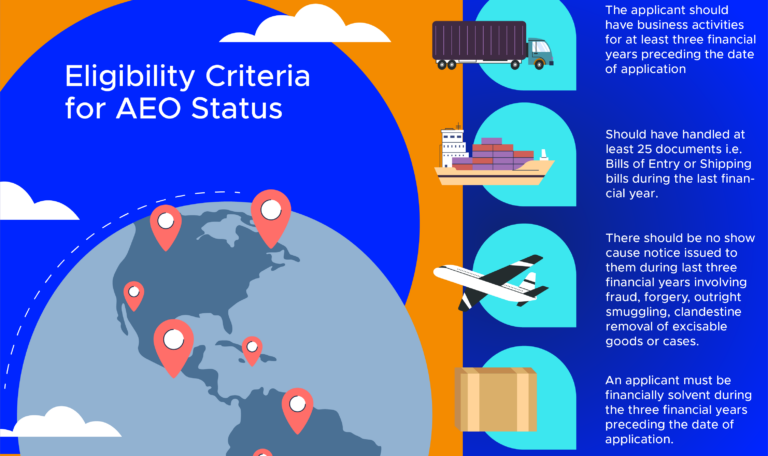The Authorized Economic Operator (AEO) Scheme, conceptualized in alignment with the World Customs Organization’s (WCO) SAFE Framework of Standards (FoS) established in 2005, represents a significant move towards strengthening security within the global supply chain—from the point of export to import.
The AEO program enables Customs administration to identify safe and compliant business entities to provide them with a higher degree of assured facilitation.
Eligibility Criteria for Applying for AEO Status in India
Anyone involved in the international supply chain that undertakes Customs-related activity in India can apply for AEO status irrespective of size of the business. These may include exporters, importers, logistic providers (e.g. carriers, airlines, freight forwarders, etc.), Custodians or Terminal Operators, Customs House Agents and Warehouse Owners. Others who may qualify include port operators, authorized couriers, and stevedores.

What is the structure of the Indian AEO program?
AEO program comes up as an important initiative to secure the international movement of products, addressing national requirements while nurturing a secure and efficient trade environment. Designed to acknowledge businesses as ‘secure’ and ‘compliant’ within the international supply chain, the AEO status functions as a quality mark, distinguishing entities as reliable trading partners. Since its launch in India through CBEC Circular No. 37/2011-Customs dated August 23, 2011, and its subsequent revisions, the AEO program has evolved, accommodating various stakeholders in the trade process, including importers, exporters, and logistics providers, thereby strengthening the security and efficiency of international trade practices.
The Authorized Economic Operator (AEO) program combines importers and exporters into a structured three-tier system, designated as AEO-T1, AEO-T2, and AEO-T3, where each level advances in the benefits provided and the compliance standards required. Additionally, the program offers a specific single-tier AEO certification, known as AEO-LO, explicitly targeting Logistics Providers, Terminal Operators, Customs Brokers, and Warehouse Operators.
The aim of the Indian Customs Authorized Economic Operator (AEO) Programme includes:
- Global Trade Security: To secure the international supply chain from the point of export to the point of import. This is expected to provide Indian businesses a competitive edge in the global market and also attract global players to Indian businesses.
- Facilitating Trade Efficiency: To streamline customs procedures, making them more efficient and compliant, including decongesting of ports and significantly reducing delivery of goods, reducing efforts at the customs for both importers and customs officers.
- Recognizing Compliant Businesses: To provide an internationally recognized quality mark indicating secure and compliant trade practices.
- Offering Operational advantage to Participants: To grant faster clearance, reduced inspection costs, and other facilitations to AEO-certified entities.
- Promoting Ease of Doing Business: To support the global trade environment by simplifying customs processes for the businesses involved.
- Building Trust: To designate entities with AEO status as ‘secure’ traders and reliable trading partners in the international supply chain.
- Encouraging Voluntary Compliance: To motivate businesses involved in the international supply chain to voluntarily adhere to customs compliance and security standards.
Compliance Cart plays a crucial role in streamlining and automating the complex process of maintaining compliance with the Authorized Economic Operator (AEO) Programme, especially for businesses involved in international trade. Through our innovative digital platform, Compliance Cart addresses various facets of compliance, risk evaluation, and documentation processes, thereby significantly enhancing efficiency and reducing the potential for errors. Here’s how Compliance Cart accomplishes this:
Classification Methodology and Valuation
Compliance Cart offers digital tools such as HSN Classification, designed to simplify the process of determining the correct classification in a user-friendly manner. Additionally, it aids in ascertaining accurate valuation in accordance with the norms of classification rules. This approach ensures that businesses accurately apply tariffs and adhere to valuation norms, thereby minimizing the risk of disputes with customs authorities.
Duty and Exemption Management
Compliance Cart’s HSN Classification, duty, and exemption management module assists businesses in identifying applicable duties and available exemptions. This ensures the accuracy of duty payments and maximizes the benefits from exemptions and concessions offered under various trade agreements and domestic laws. The primary goal of this tool is to ensure that importers and exporters avail themselves of the correct exemptions, thereby preventing the oversight of any exemptions for which they are eligible.
Foreign Trade Policy (FTP) Compliance
Compliance Cart consolidates all notifications and regulations into a single window, ensuring adherence to the Foreign Trade Policy, including restrictions, import licensing, and prohibitions. This feature facilitates compliant international trade operations.
FTA Benefits and Origin Verification
Within a single window of the Compliance Cart importers and exporters get comparative of all the FTAs that help users for managing Free Trade Agreement (FTA) benefits and origin verification in a digital mode, Compliance Cart aids businesses in leveraging preferential tariffs and simplifies the process of proving the origin of goods.
Export Benefits and Documentation
The platform assists in identifying and claiming export incentives like EPCG, RoDTEP, and Duty Drawback , streamlining the submission and management of relevant documentation.
Customs Broker Performance
Compliance Cart offers features to monitor and evaluate the performance of Customs Brokers, ensuring that they meet compliance standards and contribute positively to the AEO’s supply chain security and efficiency.
Comprehensive Documentation Review
The document manager feature of Compliance Cart facilitates a thorough review of documentation related to IGCR rules, export incentives, and the use of goods, among others, ensuring all paperwork is in order and compliant with customs regulations.
Classification Methodology and Valuation
Risk Management and Program Enhancement
By the audit checklist tool of Compliance Cart analyzing customs compliance processes, Compliance Cart identifies areas of risk and obligation, suggesting enhancements to meet existing obligations more effectively and mitigate risks.
Report Generation
Compliance Cart streamlines the creation of detailed reports on customs compliance processes, delivering valuable insights and recommendations to improve programs. Additionally, we highlight areas of compliance that may need attention, enabling straightforward rectification through our detailed reporting.
Our in-depth reports assist in identifying risks and enhancing compliance levels, facilitating importers’ and exporters’ progression from AEO 1 to AEO 2, AEO 3, and AEO LO with ease.
Compliance Cart addresses the challenges of achieving and maintaining AEO status by automating and streamlining compliance processes. Its comprehensive suite not only ensures adherence to the various regulations governing international trade but also positions businesses as secure and efficient partners in the global supply chain.











